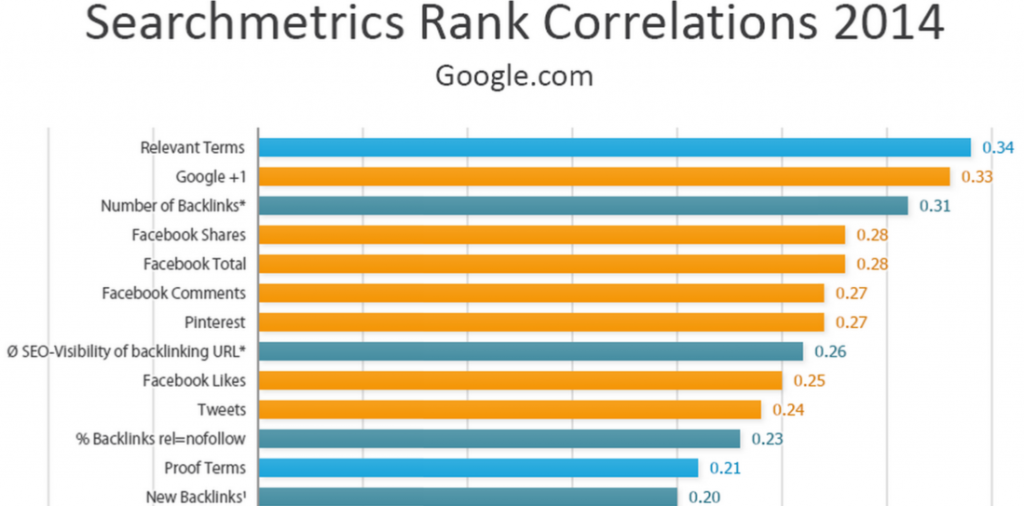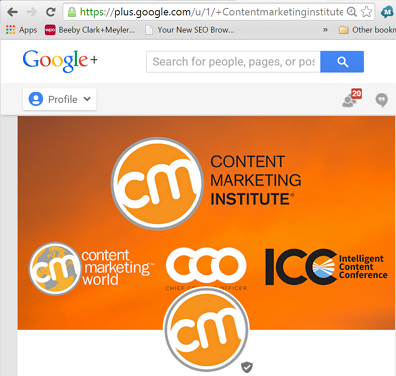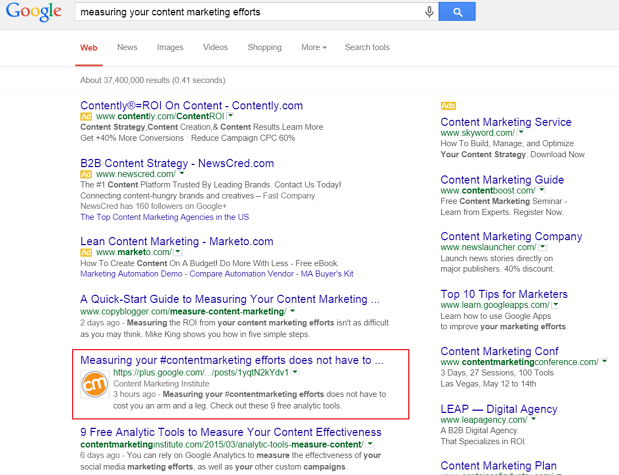
“Like” vs. Like: The Correlation Between Social Media and SEO

Ken Schaefer, SEO Manager
Are “likes” and “shares” and “followers” good for my SEO? It’s an often discussed, researched, fought over and paid-for topic. As your favorite digital agency, it’s our job and pleasure to understand any potential benefit to your site’s organic traffic and to help educate you, our favorite client. So, let’s dig in.
The research showing a correlation between ranking content and what happens on social networks has been highly touted as de-facto material showing that social shares and likes do indeed play a part in high rank in search engines.
Learn more about BCM’s SEO Services here.
The chart below is the 2014 version of a study that Searchmetrics conducts yearly. It shows us the factors that most influence organic search engine rank. It’s obvious that organic rank has high correlation with the number of shares, likes, tweets and +1’s.

It seems completely logical that this social exposure is directly influencing rankings, but is it really?
Matt Cutts, head of Google’s Webspam team, has been the spokesperson and champion of proper SEO in regards to Google for several years now. Although in the past, it was said that Google did use social signals to help determine organic rank, last year Mr. Cutts made it very clear that currently, they do not. Now, there are some special uses of G+ in regards to SEO, but more about that later…
Note that the above chart is titled “Correlations.” A correlation is defined as a connection between two or more things. That doesn’t necessarily mean that one causes or affects the other directly.
Think for a moment. On your Facebook feed, what posts (content) get the most likes and shares? Well, I’d venture a guess that it’s the best posts. “Best” might be defined as funniest, or most touching, or maybe the most informative. Those are the posts people like and if they like them, they’ll also “Like” them and “Share” them. What else might some people do? Link to that content from their blog or a forum or somewhere else on the web. We (SEO) like links. No, we LOVE links. Always have, always will.
On the flip side, what type of website content usually has the highest organic ranking in Google? Well, these days it is high-quality content. Of course, there are other factors to be considered, such as competition, backlinks, technical optimizations, etc. but if all of those things are taken care of and your content is high quality, it is likely to rank high in search engine results. And when people find it, they will be likely to share and like the content on social networks AND on blogs, forums, etc.
Now you have the beginnings of a correlation without either of the two things necessarily affecting each other.
So, you’ve developed an amazing piece of optimized, original content on your brand’s website. A major brand might release some press. There might be articles about it on news sites and blogs. And of course, you’ll have your social media agency post about it to your social networks. All of this is doing what? Creating awareness of this amazing new content? Sure. It’s also giving the content creators of the world a chance to talk about and link to your website. The backlinks created by these sources will help your content to rank better. With enough quantity and quality links, it will very likely rank high.
So, what’s the most efficient way to get your quality content in front of these people who regurgitate and publish digital content that interests them? Social networks. Now, the strength of the correlation grows.
It’s this simple really:

As of now, Google isn’t using the number of likes and shares the posted content received on social networks to influence its rankings, but because of this exposure, some % of readers that are also publishers on blogs, forums etc. will repost your link. These types of “sharing” of your content will indeed increase your chances to rank high.
What about Google Plus and SEO?
(Update – If you’re looking for the history of Google’s social network, you found it. It’s gone now though the memory lives on)
Now I’m sure you’re asking yourself, “What about Google Plus and SEO?” It’s a good question. It would be hard to believe that Google would build this social network and not use the data gained to strengthen their other products such as google.com. Well, they do use that data in a more interesting way…
First off, for people who are logged into Google services such as Gmail, Google +, or YouTube (These days, it’s hard NOT to be logged into a Google service), Google knows a good amount about you. Via Google Plus, Google knows who your friends and associates are and the types of interests you have. Via Google.com they know what you search for. Via YouTube, they know what types of videos you like to watch, etc. etc. And there are more. Think, Maps, Apps, Blogger, the Android operating system. … It wouldn’t make sense if they didn’t take advantage of that vast amount of user data across all of their platforms in some fashion.
Content posted to Google+ ranks in Google.com and ranks fast for logged in users. However, the same rules apply to this content as do for other online content: It has to be quality-optimized and focused. But, if one of the people in your Google Plus Circles posts it, it has a likelihood of ranking higher for you in Google.com, if you’re a logged-in Google user.
Here is an actual example. I have the Content Marketing Institute’s G+ page in one of my Circles and would recommend it to anyone in the digital field:

If I were doing research regarding measuring the ROI of my content development efforts, I might search for: “measuring your content marketing efforts.” When I do, note my results:

My #2 organic result is the G+ post on the topic written by my Circle Associate, The Content Marketing Institute. It was posted only 3 hours before my search query and it even features their logo in the search results. Now what brand wouldn’t love that?
In addition, if your Google+ friends “+1” a piece of content and it is related to your Google.com search query, it also may rank high in SE results. Google is essentially using the “word of mouth” recommendation of your friend to help give you relevant results.
Ok, that’s a mouthful, but for now, just understand that in a limited way, brand content on Google+ can get higher results in Google.
In Conclusion
Are Matt Cutts or Google lying how they use social signals in regards to organic rank? No, I don’t really think they are or would. I think Google regularly withholds information regarding their proprietary algorithms, but they have every right to do so. Will they change whether or not social signals influence rank? Probably. Are they testing how they can use this information to inform rank? Oh, you can count on it.
The primary goal here is to increase awareness of your quality content and get more eyes on it. Using every possible method to make that happen is going to help. Promotion of your content via social networks can be a large part of making that happen. As more people see your content and share it via the web, this will increase your exposure and help your Organic Search Engine Rank. If no one knows about it, they can’t promote it. End of story.
There is a lot of information here packed into what could be a much longer post. If you’re not already talking to us, give us a shout and we’ll discuss how we can help solve your SEO challenges.
